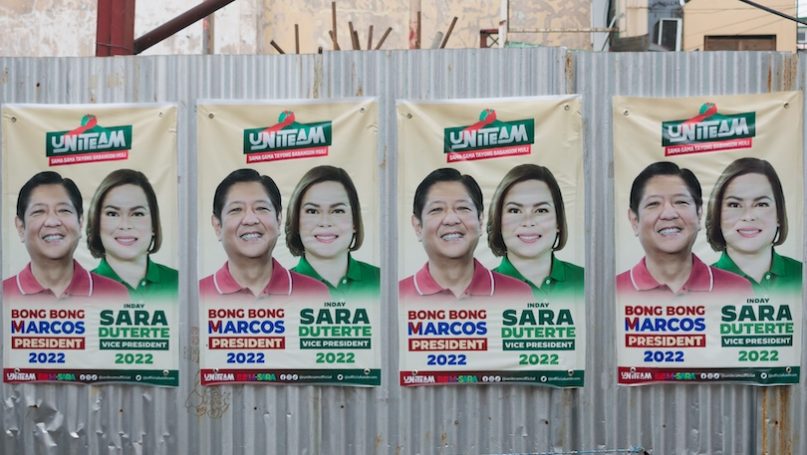
Ferdinand Marcos Jr., son of the dictator ousted in 1986, secured the 2022 Philippines presidential vote in a landslide. For the regime’s critics this represents further retrogression for a nation steeped in a malodorous rightist populism. Marcos succeeds the tough-talking Rodrigo Duterte, best known for his war on drugs that left thousands of dead. Duterte’s daughter, Sara Duterte-Carpio, is vice president in a campaign which represented a convenient political marriage of the country’s two most powerful dynasties. The election led many observers to believe that in the Philippines, nostalgia for strongmen trumps democracy.
Marcos’s journey shows how social media alters perception in a highly online country. The Philippines is a hive of disinformation, remembering how Duterte first won with the help of troll farms in 2016. As president, Marcos governs an archipelago of about 110 million, with a fifth below the poverty line. He continues the drug war, and shields the outgoing Duterte from the International Criminal Court
In campaigning, Marcos skipped election debates and interviews with independent media, instead surrounding himself with proxy social media personalities and vloggers. He was governor of Ilocos Norte in the 1980s (succeeding his aunt), before the overthrow of his father in 1986. Marcos is also expected to continue Duterte’s friendly stance toward China, and has shown ambivalence to the US about the South China Sea, which China has heavily militarized. There are also long-standing ties with the US, including between their militaries, which Marcos would be unwise to denigrate.
For Marco Garrido, Marcos’s landslide win points to the success of his social media campaign but also Filipinos’ “serial disappointment” in democratic rule over the past three decades:
The faith they had in liberal democracy has dried up … and they’ve developed this taste for illiberal rule over the course of the Duterte administration … This nostalgia for the Marcos period wouldn’t make sense unless you put it in the context of 36 years of disappointment.
The weight of history did not sufficiently weaken Marcos’ claim to the presidency. On the contrary, the historical past of his father’s regime has been celebrated as a badge of pride. In this political stupor, dictators are nostalgically remembered as strong leaders, historical facts are purposely manipulated, and the past is perceived to be glorious when compared to the present. President Rodrigo Duterte has contributed to the country’s misremembering of its past. Duterte allowed the former dictator’s family a long-standing demand: burial of Ferdinand Marcos in the National Heroes’ Cemetery. Symbolically, this helped shroud the elder Marcos with the aura of a presidency which was in reality a brutal dictatorship.
Historical amnesia is not just about willful disinformation by political partisans. In many democracies, people will revolt when current governments fail to improve the lives of the middle and working classes. Marcos Jr inherits a vision of progress through discipline because his father is now being remembered as a powerful strongman, and because he enlisted Sara Duterte-Carpio, daughter of the president and mayor of Davao, as his running-mate. Maria Ressa has termed this “digital authoritarianism.” If the public see this digital fabrication often enough on state media, many will believe it.
The deliberate distortion of history festers in a demographic structure in which about 50 per cent of the country’s voters never experienced the violence of the Marcos dictatorship. This group is especially vulnerable to social media distortion. But the problem is deeper than demography. Marcos Jr. has selected economists and technocrats to his cabinet, which bodes well for economic and public health outcomes. As the economy rebounds from a disastrous few years, poverty and income inequality remain burdensome. The Philippine economy’s dependence on remittances from overseas foreign workers, dwindling during the pandemic, also complicates recovery.
More worrisome is that Marcos Jr. is filling other key cabinet posts with patronages for oligarchs who perpetuated monopolistic practices, and with individuals under criminal investigation. He has, for instance, named vice president Sara Duterte-Carpaio Secretary of Education even though she has no relevant credentials. He has placed Conrado Estrella III for agrarian reform, despite being linked to a corruption scam. And he has made Manuel Bonoan, part of the San Miguel Corporation, secretary of the Department of Public Works.
A Marcos presidency is undoubtedly, in the words of Joshua Kurlantzik, “bad news for Philippines democracy”. The second Marcos administration looks likely to further undermine democratic values and institutions in the Philippines. The strength, and success, of the Marcos campaign demonstrates that historical amnesia must be challenged if democracy is to survive. It is imperative that, through supporting the NGO community in the Philippines and elsewhere, international sponsors challenge the twin-evils of historical amnesia and digital authoritarianism.
Further Reading on E-International Relations
- Back to the Future? Martial Law and the Peace Processes in the Philippines
- Brexit and Arms Sales to the Philippines: A Reactive Approach to Human Rights
- Human Rights and Climate Change in the Philippines
- Reimagining Susan Strange’s States and Markets: Small and Medium Enterprises in Fragile Situations
- Opinion – Bidenomics: US Trade Policy under a Biden Presidency
- Opinion – Digital Disinformation, Civic Disengagement and the Future of Democracy